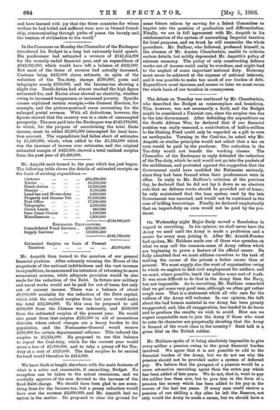In the Commons on Monday the Chancellor of the Exchequer
introduced his Budget in a long but extremely lucid speech. His predecessor had estimated a revenue of £142,454,000 for the recently ended financial year, and an expenditure of £142,032,000, which would have left a balance of £422,000. But most of the items of revenue had actually increased, Customs being £425,000 above estimate, in spite of the reduction of the Tea-duty, stamps £180,000, posts and telegraphs nearly £500,000, and the Income-tax showing a slight rise. Death-duties had almost reached the high figure estimated for, and Excise alone showed no elasticity, whether owing to increased temperance or increased poverty. Specific causes explained certain receipts,—the General Election, for example, and the picture-postcard craze accounting for the enlarged postal revenue. With all deductions, however, the figures showed that the country was in a state of unexampled prosperity. The stun paid into the Exchequer was £143,978,000, to which, for the purpose of ascertaining the total State income, must be added £9,901,000 intercepted for local taxa- tion account. The expenditure had fallen short of estimates by £1,520,000, which, when added to the £1,524,000 which was the increase of income over estimates, and the original estimated margin of £422,000, showed a total realised surplus from the past year of £3,466,000.








































 Previous page
Previous page